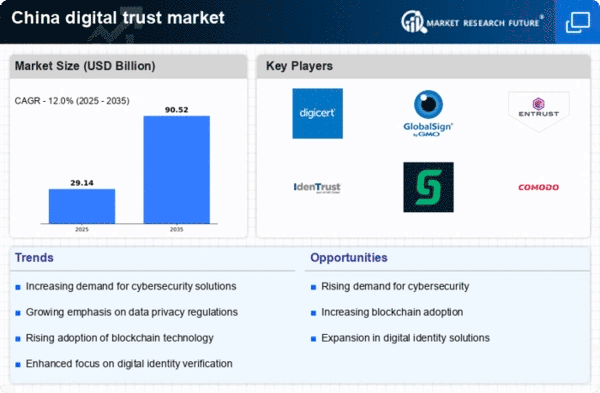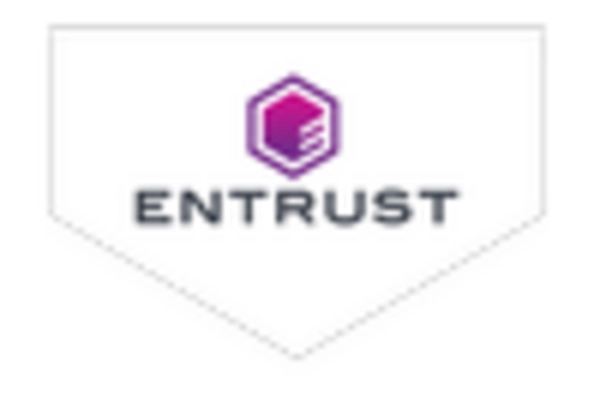Evolving Consumer Expectations
In China, consumer expectations regarding data protection and privacy are evolving rapidly. With a growing awareness of personal data rights, individuals are increasingly demanding transparency and accountability from businesses. This shift in consumer behavior is influencing the digital trust market, as companies strive to meet these expectations. A survey indicated that over 70% of Chinese consumers are concerned about how their data is used, which compels organizations to adopt digital trust solutions that enhance privacy and security. Consequently, the digital trust market is likely to expand as businesses prioritize consumer trust and invest in technologies that ensure data integrity and confidentiality.
Growing Cybersecurity Concerns
The digital trust market in China is experiencing a notable surge due to escalating cybersecurity threats. As businesses and consumers increasingly rely on digital platforms, the risk of data breaches and cyberattacks has intensified. Reports indicate that cybercrime costs could reach $10 trillion annually by 2025, prompting organizations to invest heavily in cybersecurity measures. This trend is likely to drive demand for digital trust solutions, as companies seek to protect sensitive information and maintain customer confidence. The digital trust market is thus positioned to benefit from heightened awareness and the necessity for robust security frameworks, which are essential for safeguarding digital assets.
Government Initiatives and Support
The Chinese government is actively promoting digital trust through various initiatives aimed at enhancing cybersecurity and data protection. Policies such as the Cybersecurity Law and the Personal Information Protection Law are designed to establish a regulatory framework that fosters trust in digital transactions. These regulations are expected to drive growth in the digital trust market, as compliance becomes a necessity for businesses operating in the digital landscape. The digital trust market is thus likely to see increased investment in compliance solutions, as organizations seek to align with government mandates and build consumer confidence in their digital operations.
Rise of E-commerce and Digital Transactions
The rapid growth of e-commerce in China is significantly impacting the digital trust market. As online shopping becomes increasingly prevalent, the need for secure payment systems and data protection measures is paramount. In 2025, e-commerce sales in China are projected to exceed $2 trillion, highlighting the critical importance of trust in digital transactions. This surge in online activity is likely to drive demand for digital trust solutions that ensure secure transactions and protect consumer data. The digital trust market is thus positioned to capitalize on this trend, as businesses seek to implement robust security measures to foster consumer confidence in their e-commerce platforms.
Technological Advancements in Security Solutions
Technological advancements are playing a pivotal role in shaping the digital trust market in China. Innovations such as artificial intelligence, blockchain, and advanced encryption techniques are enhancing the security landscape. These technologies offer new ways to protect data and ensure secure transactions, which is crucial in a rapidly digitizing economy. As organizations increasingly adopt these advanced security solutions, the digital trust market is likely to experience substantial growth. The integration of cutting-edge technologies not only improves security but also builds consumer trust, which is essential for the long-term success of digital platforms in China.
















